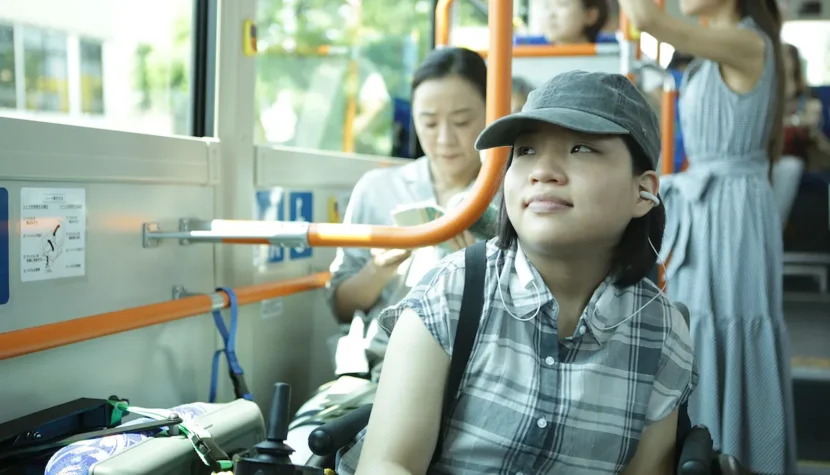37 SECONDS. On the Desires of Each of Us

A few days ago, I was looking for a light movie to watch in the evening. By complete chance, I stumbled upon a Japanese drama called “37 Seconds”, directed by a woman using the pseudonym Hikari. According to the plot summary, it was supposed to be the story of a manga artist embarking on a journey toward sexual freedom. Very quickly, I realized how little this description conveyed and how much the film gave me something entirely different than I expected.
Yuma Takada (played by Mei Kayama) suffers from cerebral palsy. And right from the start, we are faced with an important fact—the amateur actress playing this role also has this condition. Hikari made the wise decision to cast her in the role of the main character. Perhaps the director feared that no professional actress would be sufficiently authentic.

Let’s return to the protagonist. Yuma lives with her mother Kyoko (Misuzu Kanno), with whom she has a strained relationship. Kyoko is clearly overprotective. She wants to make nearly every decision for her daughter, even the most trivial ones, like the length of her hair or what she should wear each day. Keep in mind two things: first, Yuma is an adult woman. Cerebral palsy doesn’t make her incapable of making decisions for herself. Second, Yuma’s condition affects her physically, but she is fully aware of what is happening around her and is capable of logical thinking. Her mother seems to overlook this. Or perhaps the problem isn’t the daughter’s illness at all but rather the lack of a husband and a feeling of needing to be important to someone. Maybe it’s loneliness that robs Kyoko of her daughter’s freedom more than cerebral palsy. Whatever the cause of this toxic relationship, Yuma—though incredibly quiet, withdrawn, one might say fearful—starts wanting to prove to her mother at all costs that she is an independent and self-sufficient person.
But the difficult situation at home isn’t the only problem the girl faces. She also deals with unfair treatment at work. Yuma professionally draws manga, which is also her passion. She works for a well-known YouTuber, Sayaka (Minori Hagiwara). And while Yuma is actually the author of all the drawings, Sayaka claims them as her own. Moreover, she cheats Yuma financially and refuses to publicly acknowledge her because it could ruin her perfect image. Yuma, quiet as a lamb and never complaining, evokes feelings of pity in us. And this has nothing to do with her illness. We feel powerless in the face of the injustice she suffers. This feeling is intensified by the fact that Kayama, despite being an amateur, portrays her character excellently.

During a visit to the park, Yuma comes across discarded adult manga and decides to try her hand at drawing hentai. She arranges a meeting with a magazine editor, Ms. Fujimoto (Yuka Itaya), but is rejected. Not because of a lack of talent—her skill is recognized—but due to… her lack of sexual experience. The editor claims that the sex scenes aren’t drawn convincingly. To improve in this area, Yuma starts watching pornographic films and creating drawings based on them. But these films awaken hidden desires in her. She begins exploring the world of sex and masturbation, which, at her age, is entirely normal. Hikari makes us realize that people with disabilities have the same needs as able-bodied individuals. And once again (though not for the last time), applause goes to the actress playing the lead role.
However, it quickly becomes clear that pornography alone isn’t enough. Yuma, behind her overprotective mother’s back, begins going on dates, subconsciously seeking sexual experiences. In a twist of events, she ends up at a place that offers paid love, and although she is completely intimidated, she decides to take advantage of the services. I won’t spoil the details for you, but I’ll just say that this scene is very sad and thought-provoking (yet again in this film) and that once more, the inexperienced actress deserves praise.
Yuma then meets new people—a prostitute named Mai (Makiko Watanabe) and her driver, Toshiya (Shunsuke Daito), who completely change her life. Thanks to them, Yuma discovers what real fun is. Mai takes her to a sex shop, which is a brand-new experience for her, as well as on a shopping spree for more feminine clothes and makeup products. Yuma becomes aware of the differences between herself and other women, and it’s not about her disability. Yuma wants to be seen as a woman. But the shopping trips are just one part of what she experiences with her new friends. They also take her to parties where she tries alcohol for the first time and gets a bit tipsy. And no, we don’t have a crude scene of drunkenness, but a normal night out with friends and a bit of the wildness that Yuma never had the chance to experience.

However, if you think the film will continue to be about parties and socializing, you’re mistaken. I assure you, Hikari’s drama develops in directions you wouldn’t expect.
As I’ve repeatedly emphasized, casting Mei Kayama in this role was a stroke of genius, and she handled the part beautifully. I wonder how much of her own life experiences she brought into certain scenes and how difficult they were for her to perform. Hikari hides nothing in her film. We see scenes depicting the daily struggles of a person with cerebral palsy, such as bathing or moving without a wheelchair. We also see masturbation scenes and sex scenes. And there are many challenging relationships portrayed.
In my opinion, Hikari’s film is a must-watch on Netflix. “37 Seconds” fully deserves an 8/10 rating, and I eagerly await more films from this Japanese director.

